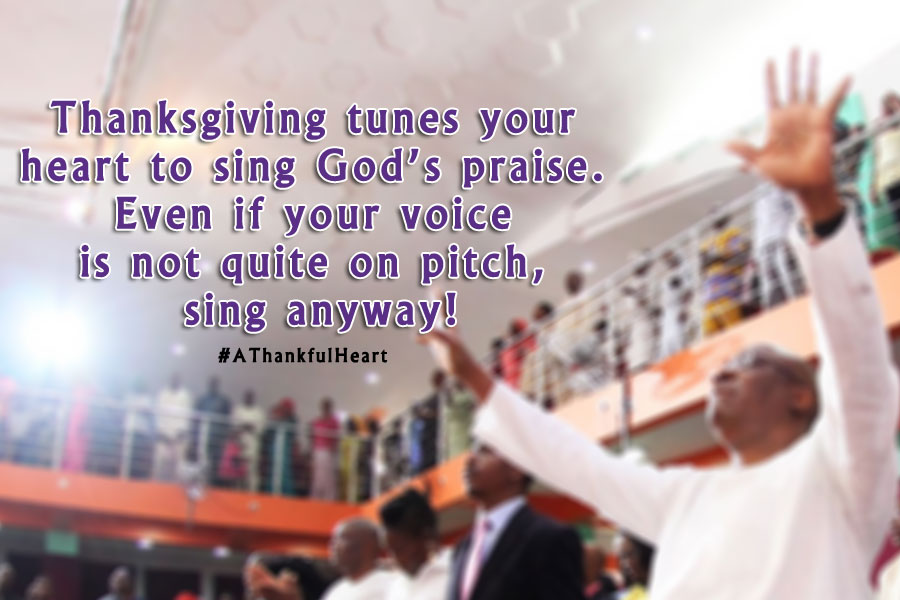How do you say “thank you” for God’s goodness? Really, is it possible to fully express our thanks? Psalm 100 is the outpour of a heart focused on God’s abundant blessings to His people. When your heart is overflowing with gratitude, it will find an outlet. Make a joyful noise unto the LORD, all ye lands. Serve the LORD with gladness: come before his presence with singing.
Joy is the outgrowth of a thankful heart. Even in our darkest days, we have more blessings than we can count. And if we will actually pause to count them, as the song “Count Your Blessings” says, we will be surprised “at what the Lord hath done.” Thankful people are joyful people. All throughout the psalms, thanksgiving and singing are linked together. Psalm 95:2 says, “Let us come before his presence with thanksgiving, and make a joyful noise unto Him with psalms.” The song “Come Thou Fount” reminds us, “Streams of mercy, never ceasing, call for songs of loudest praise.”
Thanksgiving tunes our hearts to sing God’s praise. Even if your voice is not quite on pitch, sing anyway! God loves to hear your songs of praise. Are you looking for a way to express your thankfulness to God? Count your blessings, and sing to the Lord. Gratitude is part of a wider outlook on life that involves noticing and appreciating the positive aspects of life. It can be attributed to another person or a non-human (e.g., God). It is also commonly an aspect of spirituality, said Mills. Because previous research has shown that people who considered themselves more spiritual had greater overall well-being, including physical health, Mills and his colleagues examined the role of both spirituality and gratitude on potential health markers in patients.
The study involved 186 men and women who had been diagnosed with asymptomatic (Stage B) heart failure for at least three months. Stage B consists of patients who have developed structural heart disease (e.g., have had a heart attack that damaged the heart) but do not show symptoms of heart failure (e.g., shortness of breath or fatigue). This stage is an important therapeutic window for halting disease progression and improving quality of life since Stage B patients are at high risk of progressing to symptomatic (Stage C) heart failure, where risk of death is five times higher, according to Mills.
Using standard psychological tests, the researchers obtained scores for gratitude and spiritual well-being. They then compared those scores with the patients’ scores for depressive symptom severity, sleep quality, fatigue, self-efficacy (belief in one’s ability to deal with a situation) and inflammatory markers. They found higher gratitude scores were associated with better mood, higher quality sleep, more self-efficacy and less inflammation. Inflammation can often worsen heart failure.
What surprised the researchers about the findings, though, was that gratitude fully or partially accounted for the beneficial effects of spiritual well-being. “We found that spiritual well-being was associated with better mood and sleep, but it was the gratitude aspect of spirituality that accounted for those effects, not spirituality per se,” said Mills. To further test their findings, the researchers asked some of the patients to write down three things for which they were thankful most days of the week for eight weeks. Both groups continued to receive regular clinical care during that time.
“We found that those patients who kept gratitude journals for those eight weeks showed reductions in circulating levels of several important inflammatory biomarkers, as well as an increase in heart rate variability while they wrote. Improved heart rate variability is considered a measure of reduced cardiac risk,” said Mills. “It seems that a more grateful heart is indeed a more healthy heart, and that gratitude journaling is an easy way to support cardiac health.” Thanksgiving involves a complex emotion that requires self-reflection, willingness to admit dependency on God and others, and the humility to realize our own limitations.
Thanksgiving is a significant way for believers to appreciate what they have instead of always reaching for something new in the hopes it will make them happier, or thinking they can’t feel satisfied until every physical and material need is met. Gratitude helps people refocus on what they have instead of what they lack. And, although it may feel contrived at first, you will grow stronger in it with use and practice. “In everything give thanks: for this is the will of God in Christ Jesus concerning you.” 1 Thessalonians 5:18






